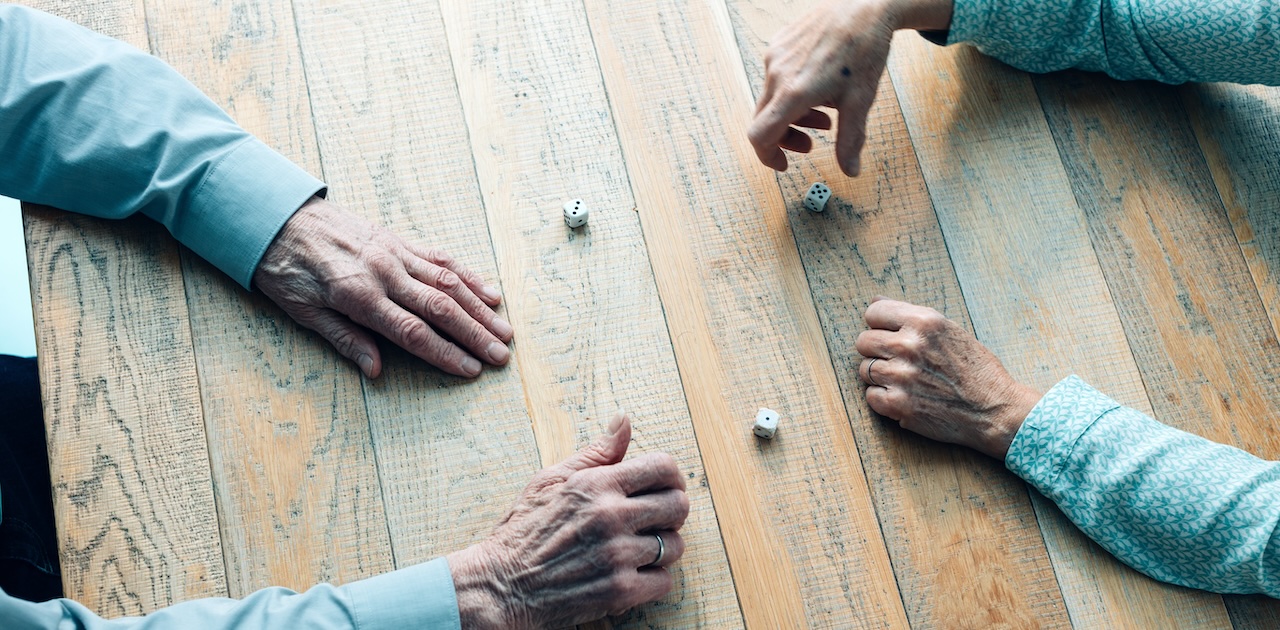
The following is for information purposes and should not be construed as legal advice.
Is Bunco considered gambling in the US? Yes, but not likely — unless you're playing for real money. Sort of.
Bunco in the United States was originally a con-man’s game using fixed games or dice, and because of its various gambling schemes, became a target for law enforcement. People commonly played Bunco in Bunco parlors, typically with rivers of alcohol flowing nearby. It’s even where Bunco Squads get their name — special police units sent to root out the lawless Bunco group operating in the shady gambling parlors of San Francisco or the southwest. Even being present at these illegal gambling events could lead to arrest.
But Bunco has evolved from a dice game of sin into a social dice game. Following the Civil War, Bunco evolved from a game associated with gambling dens into a popular social parlor game, reflecting its adaptation and the changing social norms of the time.
Many groups today play with friends or offer modest cash prizes or gifts across six rounds of turns hosting tables of four players. The prizes can add up to some real value, however, and in some states, a lot of people coming together to play for cash can be considered gambling.
In the United States, most states define gambling as any time you risk something of value, and that’s usually money. Note that it’s almost always state laws that delineate what constitutes illegal gambling and the consequences, not the federal government. Some local municipalities may have restrictions on gambling, too.
Bunco for charity and nonprofit organizations
Most people aren’t keen on setting up formal, long-term Bunco casinos. But nonprofits and groups looking for ways to raise money can set up for a night in most states with a temporary gaming license.
Since Bunco involves three dice and not much else, it’s technically a “game of chance.” That means you’ll need a gaming license if you plan to organize lotteries, raffles, or similar games of chance for fundraising or commercial purposes.
Most states’ gaming commission websites can help you understand the rules, policies, and procedures in your jurisdiction. Some cities and counties may also have special rules for gaming. Consult your local counsel for details. We’re not guaranteeing this is true for your area.
How your Bunco group can play for all the money — no gaming license necessary
Clever groups seeking a single night of Bunco fun can sometimes circumvent issues with gaming licenses—which can be hard to acquire and take a considerable time in some states—by avoiding changing anything “of value.”
Many nonprofit groups hosting fundraisers, galas, and other events will sell you drinks or some other tangible asset, like food, and give you tokens or tickets along with that drink or food. These tokens or tickets can basically be used as “currency” at gaming tables. Instead of “buying” the coins, you technically bought a drink or food. And instead of “risking anything of value” you’re technically playing with otherwise worthless tokens or tickets that just happened to come with your drink.
The whole process takes a similar legal approach to Chuck-E-Cheese or other kids’ gaming arcades, where instead of risking money, they risk or win tickets. Keep in mind this diminishes the fair market value of a donor’s contribution and subsequently reduces the amount of money they can write-off as a tax-deductible contribution.
At the end of the night, you can add up whoever has the most tickets or tokens and declare a winner, who will walk out with a special designation that enables them to claim a prize.
For most of us, however, a simple gaming night with girlfriends or new friends generally means food, fun, and conversation or small amounts of winnings. If you need an idea for your gaming night, check out our guides on Bunco prizes, and how to play for money.
Responsible gaming best practices for fundraisers and charities
Responsible gaming is all about enjoying the game while keeping it fun and safe. Set limits on the amount of time and money you spend on gaming activities. Make sure you understand the rules and legal implications of the games you play. By practicing responsible gaming, you can enjoy Bunco and other games without the risk of negative consequences.
Additionally, excessive gaming can lead to financial problems, relationship issues, and other negative outcomes for people with gambling problems. Certain types of gambling-related conduct, such as knowingly allowing illegal gambling, can lead to serious legal ramifications. Be aware of your guests and who is registered with voluntary exclusion programs. These programs allow residents to voluntarily ask gambling establishments to prohibit their admission. It’s typical of casinos. Check your state’s gaming commission for requirements.
Play Bunco anytime, online, with no risk or gambling losses
There's nothing illegal about our free online Bunco game. You can bet it's fun and doesn't require any app downloads, accounts, or special hardware. Just roll the dice and strive to be the virtual player with the most Buncos at playbunco.com.